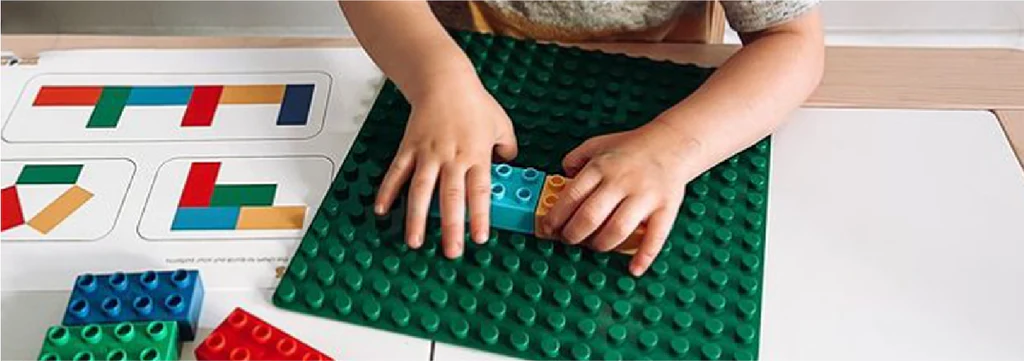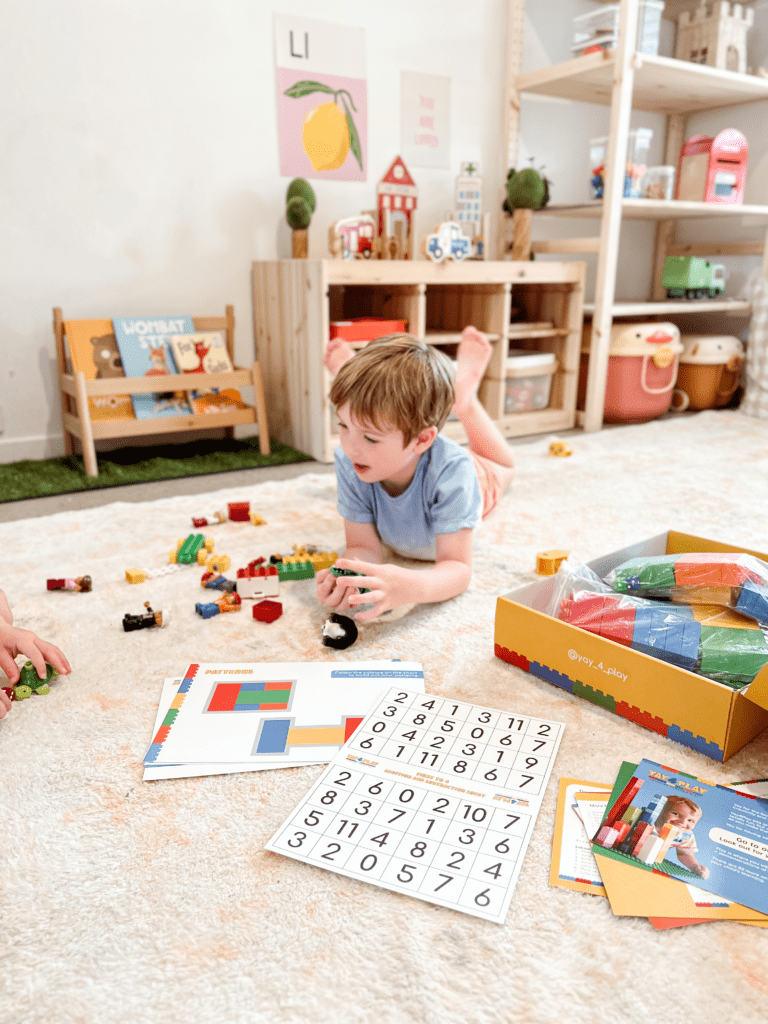Uncover unique play-based learning strategies that encourage creativity, life skills, and holistic development. Create a play-based learning environment using tools like Six Bricks for impactful growth and ongoing cognitive development.
Children don’t just learn by sitting still—they learn by moving, exploring, and engaging with the world around them.
Play-based learning activities takes this natural curiosity and transforms it into a powerful educational experience. This type of learning process creates opportunities for children for deep, meaningful growth.
The Deeper Impact of Play-Based Learning
While traditional academics focus on structured learning, play-based learning tools introduce problem-solving skills, critical thinking, and emotional development.
Here’s how play transforms learning environments:
- Stimulates Imagination: Encouraging creative thinking and problem-solving through imaginative scenarios.
- Builds Resilience: Allowing children to experience challenges, learn from mistakes, and develop perseverance. This is an important aspect of social development.
- Nurtures Collaboration: Fostering teamwork, sharing, and empathy through group activities.
- Enhances Communication: Providing opportunities to practice language skills in real-time, interactive environments. A great example of active engagement in reading, is through our Build-a-Book series.
- Boosts Motor Skills: Developing physical coordination and fine motor abilities through movement-based play. Sensory skills also form part of this learning journey.
- Lays Literacy Foundations: Through pattern games and sequencing, children build foundational literacy skills and develop numeracy concepts.

Unveiling the Layers of Learning Tools with Play
When educators set up a play-based environment, they ensure the ongoing academic success of the children in their centre.
1. Strengthening Cognitive Foundations
Activities like sorting, sequencing, and problem-solving games encourage children to think critically, analyse situations, and sharpen their memory skills.
Each of these playful experiences for children becomes a mental workout, building stronger cognitive pathways.
2. Language and Communication Growth
Interactive storytelling, role-play, and descriptive games help children develop language skills while fostering self-expression and narrative thinking.
When children take the lead in storytelling, they practice both communication and comprehension.
3. Physical Mastery Through Movement
Tactile and physical play, like building or manipulating objects, enhances fine motor control, balance, and coordination.
Activities like obstacle courses also encourage gross motor development, supporting overall health and well-being.
4. Building Emotional Resilience
Play offers a safe space for children to process emotions, learn self-control, and experience empathy.
When play scenarios involve navigating setbacks, children learn to adapt, solve problems, and persevere.

Innovative Play-Based Learning Tools
There are endless examples of play-based programs – all of which lead to active learning.
Here are some activity ideas for you:
1. Nature’s Treasures Discovery
Take children on a nature walk and encourage them to collect natural objects like leaves or pebbles. Create art from their findings or use the objects for sorting and counting activities.
2. Storytelling Through Bricks
Challenge children to build a scene with bricks and narrate a story about it. This not only develops spatial awareness but also encourages imagination and language growth. This also forms the basis of literacy skills.
3. Logic and Puzzle Challenges
Set up problem-solving tasks, like constructing a path for a toy car or completing a puzzle that enhances logical reasoning and patience.
4. Everyday Role-Play Adventures
Design scenarios that mimic real-life environments, like a bakery or market. This fosters understanding of everyday social dynamics while strengthening communication skills. It also ensures that there is body awareness and body movement.
5. Sensory Sorting Stations
Provide a collection of materials with different textures, shapes, and colours for children to sort. This activity sharpens categorisation, sensory awareness, and critical thinking.
6. Imaginative Obstacle Courses
Create courses that combine crawling, jumping, and balancing. This type of play promotes physical skills. It also challenges children to think strategically about navigating obstacles.
7. Creative Pattern Repetition
Ask children to create and replicate patterns using bricks, beads, or natural materials. Pattern play is a foundational skill for both literacy and mathematical understanding.
8. Rhythmic Music Circles
Introduce musical instruments or clapping games to enhance rhythm, listening, and motor coordination. Group music sessions also build social skills and cooperation.
9. Recycling Craft Creations
Encourage children to use recycled materials to build art projects. This not only nurtures creativity but also introduces early environmental education.
10. Memory and Match Games
Design memory challenges that involve matching pictures, objects, or words. This boosts recall abilities and strengthens cognitive pathways.

Why Six Bricks Transforms Play-Based Learning
Six Bricks is more than a simple tool—it is a catalyst for deeper, more engaging learning.
Each activity with Six Bricks unlocks essential skills and help children understand complex concepts in a hands-on way.
Here are some of the numerous benefits of this methodology for childhood educators:
- Cognitive Skills: Activities like pattern matching and sequence building encourage logical thinking and memory development.
- Physical Dexterity: Stacking and arranging bricks promotes fine motor coordination and spatial awareness.
- Social Dynamics: Group challenges and games using Six Bricks foster teamwork, patience, and effective communication.
- Emotional Confidence: Solving problems through playful tasks boosts resilience and self-esteem.
Six Bricks activities that educators and parents can introduce include to boost basic concepts include:
- Brick Colour Matching: Enhance cognitive recognition and fine motor skills.
- Structure Challenges: Strengthen balance, focus, and patience.
- Sequence Replication: Encourage memory retention and critical thinking.
- Sorting and Classification: Teach organizational skills and logical reasoning.
By embedding Six Bricks into daily activities, learning becomes an intuitive and joyful process. It’s an essential addition to any play-based curriculum.
Discover more creative ways to integrate Six Bricks into your educational approach by visiting Six Bricks Learning.
Conclusion
True learning happens when children are engaged, curious, and having fun.
Play-based learning—especially with versatile tools like Six Bricks—creates environments where essential skills are built naturally and joyfully.
By encouraging creativity, resilience, and critical thinking, play sets the stage for a lifelong love of learning.
All you need are the 6 x DUPLO type bricks in yellow, orange, red, green light and dark blue.

FAQs
Q1. How does play-based learning benefit children’s development? Play encourages cognitive growth, physical development, social skills, and emotional well-being, making it a holistic educational approach.
Q2. Why use Six Bricks as a learning tool? Six Bricks activities foster problem-solving, memory, and motor skill development, offering hands-on, practical learning experiences.
Q3. Can these activities be adapted for home learning? Absolutely! Most activities, including sensory play can be done at home using everyday objects and Six Bricks.
Q4. How does play influence emotional growth? Through play, children learn to process emotions, develop empathy, and handle challenges, all essential for emotional resilience.
Q5. What strategies can educators use to integrate play into learning? Educators can design interactive stations, role-play scenarios, and group challenges to keep play central in the learning experience.
Explore play-based learning strategies today, and create environments where growth, curiosity, and creativity thrive!
For more information about how Six Bricks can assist your school to set up a true play-based learning environment, click here….
